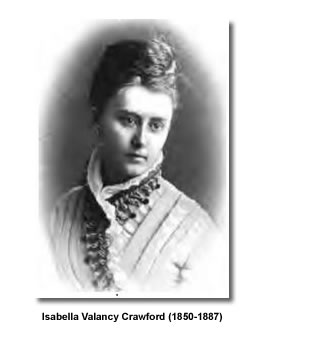ISABELLA VALANCY CRAWFORD (1850-1887)
by Christa Zeller
Crawford, the most well known of Canada’s early women poets, was born in Dublin to a cultured and educated yet genteelly impoverished family. Her father, Dr Stephen Dennis Crawford, was an unsuccessful physician. The family’s decision to emigrate may have been linked to Ireland’s dire condition during the mid-nineteenth century when the country was plagued by famines. The Crawfords came to Canada in 1858, where Isabella’s father was the first doctor in the village of Paisley, Ontario. The family’s poverty, however, persisted unabated. In the early 1860s Dr Crawford moved his family to the more established community of Lakefield, where they initially stayed in the house of Robert Strickland, nephew of writers Susanna Moodie and Catharine Parr Traill, and where Isabella, according to poet Dorothy Livesay, became a close companion of Traill’s daughter Katie. As well, the nearby Stony Lake Indian reserve may have nourished an interest in aboriginal myths and legends that was to become an integral part of Crawford’s most memorable poems.
In 1869 Dr Crawford set up practice in the bustling market town of Peterborough, Ontario. During these years, Isabella began to publish poems and stories in newspapers. Her first-known publication is the poem “The Vesper Star” which appeared in the Toronto Mail on 24 December 1873. Meanwhile, the Crawfords’ hardships continued: while resident in Paisley, Dr Crawford was tried and convicted for misappropriation of public funds, disgracing himself and his family; upon his death in July of 1875, his wife and two surviving daughters were left penniless and dependent on Isabella’s meagre income from literary earnings (the only surviving son, Stephen Walter, had left home at sixteen to find employment in northern Ontario); another blow came with the death from consumption of Isabella’s only surviving sister, Emma Naomi, in 1876 at twenty-one. Sometime following her father’s death, Isabella and her mother moved to Toronto, the publishing centre of Canada, where, starting in 1883, they lived in a series of boarding-houses until Crawford’s untimely and sudden death from heart failure in February of 1887.
During the productive Toronto period, Crawford contributed numerous short stories, novellas, and serialized novels to New York and Toronto papers and magazines. While writing prose provided Crawford with a precarious income, her literary reputation is based on her poetry, in particular on her long narrative poems. In these her extraordinary talent is manifest in all aspects of her writing, from plot and characterization, to her skilled use of various metrical forms and often startling imagery. The best known of her narrative poems is Malcom’s Katie: A Love Story, which blends blank-verse narrative with short lyric sections in a manner reminiscent of Tennyson’s “The Princess.” A romance of Canadian nation building, the poem is notable for its attempts to link the nineteenth-century project of settlement with a mythologized aboriginal past. According to Crawford scholar Cecily Devereux, this strategy enables Crawford’s settlers to claim for themselves a Canadian identity based on metaphors of aboriginality that work to exclude actual First Nations people from the poem’s vision of Canada’s future.
Though Crawford published only one book in her lifetime—Old Spookses’ Pass, Malcom’s Katie, and Other Poems (1884)—she remains one of the most important figures in Canadian post-Confederation literature.
|



